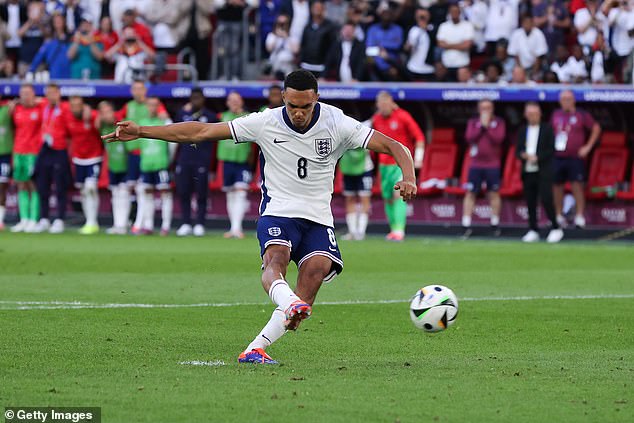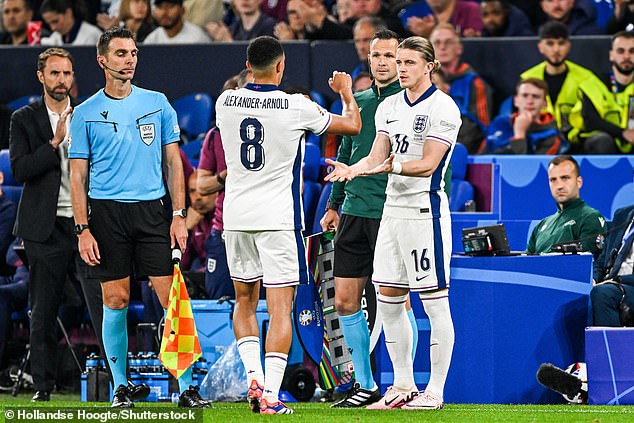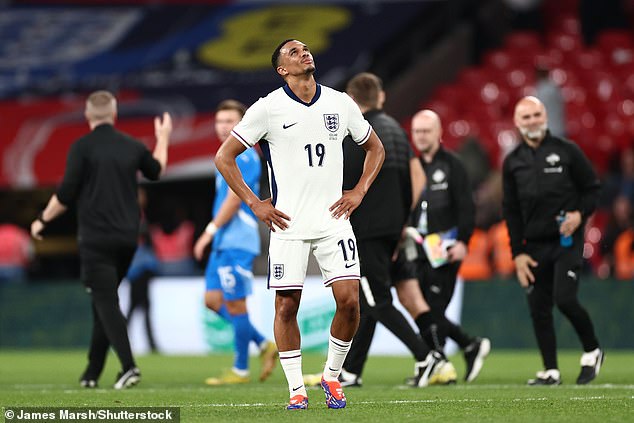England have not won any prizes for their style at this Euro. They have not dazzled us with fluid football. They have not swept teams aside completely. They have seen doors half-open and, time and again, they have walked through them like silent assassins.
They have become masters at winning ugly and while it is not exactly what many expected from a team that was hailed before leaving for Germany as the one with all the talents, there is still beauty to be found in their resilience and their stubborn, determined, dogged refusal to lose.
In previous tournaments, when England have struggled to find their flow, they have flown home early.
Roy Hodgson’s team were eliminated from the 2014 World Cup in Brazil after eight days. At Euro 2016, England were humiliated by Iceland in the last 16. We have not been able to hold on for long.
But this England team is different. Still here, still fighting, still angering home fans who seem to expect Gareth Southgate’s side to play like Brazil at the 1982 World Cup.
Trent Alexander-Arnold came off the bench to score the winning penalty for England.
That hasn’t happened, but there’s still plenty to admire in this team’s determination not to buckle in the face of adversity.
Trent Alexander-Arnold is one of the players who epitomises that quality. When Southgate abandoned the experiment of putting him in midfield midway through the second group game against Denmark, it looked as though his involvement in the tournament was over.
In his position, made the scapegoat, many might give up. Many might fall into catastrophe, harbour resentment or withdraw into themselves. Alexander-Arnold exemplified the resilience of this England team by taking a different path.
As England struggled to hold off Switzerland in the second period of extra time in their quarter-final in Dusseldorf on Saturday night, Southgate pulled Alexander-Arnold off the bench and told him to try and win the game.
When that didn’t work, he was going to win the game another way. After the final whistle, Southgate let him know that he had been chosen to take the fifth penalty in the shoot-out, the shot that often requires the most courage, the one that decides the game and that happened again in Dusseldorf.

The Liverpool star kept his cool under pressure and led his team to the semi-finals.
“It was exciting,” Alexander-Arnold said after walking through England’s press base near the team hotel in eastern Germany on Monday.
‘When you go to the competition venue, you know what you’re going to do and you’ve practiced for it. I was lucky to have the opportunity to secure a place in the semi-finals. It’s positive pressure.
‘I’d never been in that position to score a decisive penalty before, so it was a new experience for me. I was more excited than nervous. There was no part of me that was nervous. I enjoy those moments.
“I’m a player who likes to be in important matches, in important moments and win. I had everything planned in my head and I was able to carry it out.”
Everything Alexander-Arnold said on Monday was based on the theme of strength in the face of adversity. He spoke admiringly of England captain Harry Kane, who has not looked in top form in this tournament and has struggled against the Swiss.

Alexander-Arnold started England’s first two games in the tournament but lost his place.
He was asked whether his Liverpool captain Virgil van Dijk, who will be at the heart of the Dutch defence on Wednesday, would be happy if England left out Kane.
“Anyone facing England would like Harry Kane not to play,” Alexander-Arnold said. “Anything in and around the box, you have to be on red alert. He’s the best finisher I’ve ever seen or played with.”
Alexander-Arnold was enthusiastic about the subject. He also spoke about the criticism Southgate has received, the qualities the England manager possesses and the confidence he has instilled in this group of players.
“In this tournament, more than ever, we have shown the fight and tenacity to come back in knockout matches,” said the Liverpool vice-captain.
‘No matter what they’ve thrown at us and no matter what people say, we believe, we stay in a bubble and we work hard, we fight for each other and that comes from the coach. We believe that we are good enough to beat any team that comes against us.
‘All 26 of us want to play as many minutes as we can. Obviously, that’s not possible, so the coach has to choose a team and we all respect his decisions. It doesn’t matter how many minutes you play or when you step on the field, you have a role to play.

He could have given up after being ruled out, but instead he exemplified the team’s resilience.
“We all believe that and we have believed that from the beginning. No matter what role you play, you earn your medal. You see that unity in the group.
“The game makes you travel. Of course, I would have liked to keep my place in the team and start every game, but the coach has made decisions and I respect them. And they have worked. We are still in the competition. We are looking forward to the semi-final.
‘No matter what happens, the team always comes first and you have to accept that to give the team the best chance possible and be ready for whatever moment it is. Being ready for the moment, that’s the mentality.
‘There are no negative vibrations or energy in any of the decisions that are made.
‘You have to be ready for the moment when it comes and I think the other day against Switzerland, I personified that more than anything.
‘The path I’ve taken in football so far has taken me through ups and downs. My good times and my bad times. And it’s in those moments that you realise what you can endure mentally and what you can overcome.
“No matter what the game throws at me now, I feel like I’m ready to handle it and be able to perform and do my best in whatever role I’m in. I see that throughout the team.”
‘Everyone has their own story and their own path, where they have to overcome setbacks and things that might have gotten them down. Everyone goes through their own things, whether it’s on or off the court.
“It’s about how you recover.”

